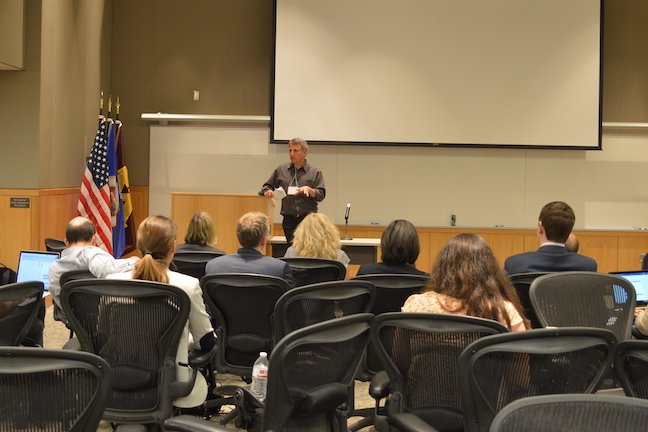Engineers and clinicians collaborate to combat cancer

A physical sciences in oncology workshop helps scientists generate ideas to better approach tumor treatment
May 31, 2019
Biomedical engineering professor David Odde believes that cancer should be analyzed not only from a biological standpoint but also from a physical one. To him, using engineering knowledge to understand cancer is like “unleashing another weapon against the tumors.”
“[Cancer] really is a physical disease, and understanding the physics of these problems is just as important as understanding the genetics,” explained Odde, who is also the director of the University of Minnesota’s Physical Sciences in Oncology Center and University of Minnesota Masonic Cancer Center researcher. “If we can understand both, we have a much better opportunity to contain and maybe even wipe out these tumors.”
Understanding both sides of cancer is exactly what Odde and a group of engineers, researchers and clinicians aimed to do at a recent brain tumor workshop hosted by the University of Minnesota’s Physical Sciences in Oncology Center. Professionals from around the country spent two days exchanging ideas and innovating new ways to tackle cancer, which culminated in a series of project proposals on Thursday, May 30.
For Minnesota neuro-oncologist Elizabeth Neil, these connections resulted in a collaborative project with Jennifer Munson, a Virginia Tech professor who researches the movement of particles around cancer. Using Munson’s imaging technology, the pair plans to record and analyze patient data in the hopes of better understanding the implications of an implantable device Neil’s clinic uses.
“From a clinician standpoint, we have all these questions and we don’t even know that there are people investigating the answers,” Neil said. “And so, being able to hear what other people are investigating and helps me understand how that is applicable to what I’m seeing in the clinic.”
In addition to Neil’s project, the workshop yielded several other research proposals, spurred by breakout sessions on topics ranging from clinical trial design to tumor microenvironments and drug delivery. Now, all that remains is finding funding to jumpstart these projects.
“You’re getting new perspectives because you have people who have never met each other before but all have something to bring to the problem,” Odde said. “We’re hoping that by generating ideas around the same theme, we might be able to track new funding as a group more from people who might see value in what we’re trying to do and help us get there.”
The U of M Physical Sciences in Oncology Center launched with an $8.2 million grant from the National Cancer Institute. With this workshop, it continues its mission of using multidisciplinary research to better understand and treat cancer.
To learn more, visit the Physical Sciences in Oncology Center’s website.
Story by Olivia Hultgren
